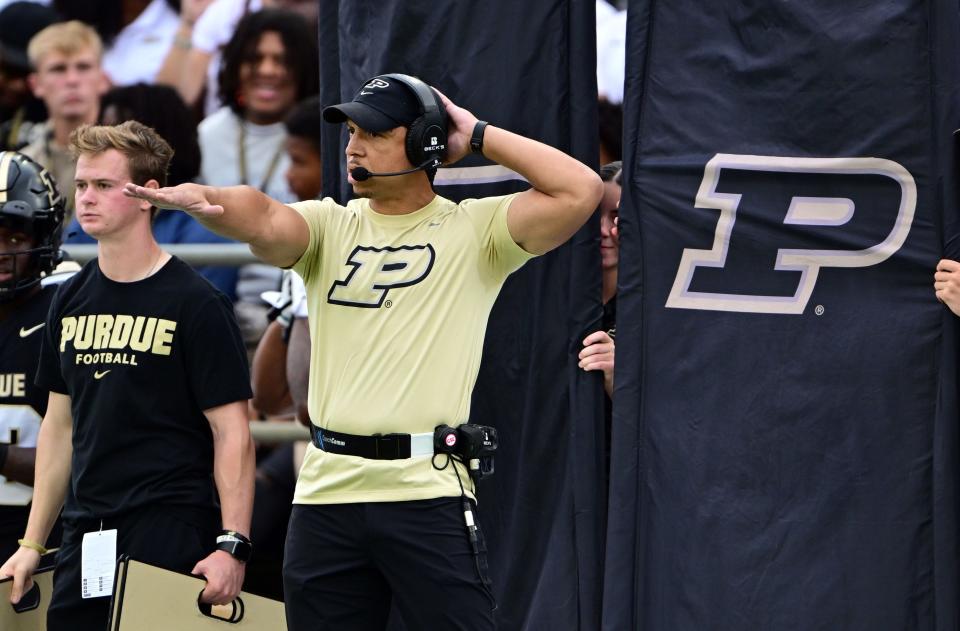What would Purdue owe Ryan Walters to fire the football coach after this season?

INDIANAPOLIS – A miserable 52-6 loss at Wisconsin on Saturday intensified scrutiny of the Purdue football program’s direction under coach Ryan Walters.
The product on the field has arguably hit rock bottom, ranking among the worst FBS teams in numerous offensive and defensive measurements. Unlike an NFL team suffering through a lost season, Boilermakers fans cannot look forward to the competitive correction of earning a high draft pick.
INSIDER: Ryan Walters falling short in head coach's main job
DOYEL: Purdue football is bad, folks. How bad? Perhaps hopeless.
Quite the opposite. Purdue's already low-ranked 2025 class lost two commitments in the past week — including the only player ranked in the top 400 of the 247Sports composite. Its four-star 2026 quarterback also back off his commitment.
The call for change among alumni and fans grows louder each week. However, college athletics’ present economic environment makes firing a second-year football coach inconvenient at best — and potentially unrealistic.
What is Ryan Walters' buyout?
Coaching contracts stipulate the conditions for firing coaches “with cause” — think NCAA violations, legal matters, breaking university conduct rules, etc. — or “without cause,” typically, losing. As a general rule, schools owe coaches nothing when firing them with cause.
To fire Walters without cause, though, would require a significant buyout at the same time the athletic department is bracing for revenue sharing with athletes and other increased expenditures.
Per contract language, Purdue would owe Walters 75% of his base compensation if firing him without cause. Walters is due to make $4.1 million in 2025, $4.15 million in 2026 and $4.2 million in 2027. He would be owed a buyout of $9.3375 million for those three remaining years if terminated after this season.
That sum pays out in equal monthly installments until the contract's end date of Dec. 31, 2027. That’s still a significant expenditure on the books for an athletic program still figuring out how to pay $20 million-plus per year in revenue sharing.
What would Purdue owe assistant coaches?
All 10 of the “countable” assistant coaches per NCAA definition are entitled to 100% of their remaining contracts. Most of those contracts expire on Dec. 31. If Walters remains the head coach, he must make staff changes. Those expiring contracts make that process cleaner and cheaper.
For now, Purdue is on the hook for $1 million for the third and final contract year of former offensive coordinator/quarterbacks coach Graham Harrell, who Walters fired on Sep 30. However, his contract was contingent on .Walters’ continued employment. If Walters is fired, Purdue only owes Harrell 90 days of base salary and benefits from the day of the head coach's firing — around $250,000.
Same goes for defensive coordinator Kevin Kane ($850,000 contract for 2025) and special teams coordinator Chris Petrilli ($250,000) — the only “countable coaches” per NCAA parlance under contract next season. Purdue would owe them about $275,000 total.
The contract for director of football strength and conditioning Kiero Small ($500,000) does not contain that head coach firing provision or other mitigating language.
The total owed to Walters and those four staffers, if fired after the season, comes to roughly $10.36 million. That number could be slightly larger, as contract language was not immediately available for all analysts, quality control coaches and other staffers.
Can Purdue afford to pay two coaches?
Then comes another large expense — one difficult to estimate with any certainty.
Purdue would need to hire a new staff. That could require paying buyouts of the incoming head coach and possibly some assistants.
The last time Purdue found itself in this position came in the third year of Darrell Hazell’s tenure. At that time, money was not the main stumbling block.
Rather, the Board of School Trustees had not moved quickly enough to secure a succession plan for the late Morgan Burke. Having previously hired and fired Danny Hope, Burke could not realistically be the athletic director to also fire Hazell and hire the successor.
In February 2016, Burke announced his plan to retire by July 2017. Purdue hired Mike Bobinski to replace him on Aug. 9, 2016. He fired Hazell 68 days later, with Purdue owing a $4.45 million buyout.
Back then, Purdue could line up donors to absorb that one-time hit, if necessary. Today, it already asks those donors to support the name, image and likeness efforts necessary to put a competitive team on the field. That comes in addition to whatever philanthropy those individuals bestow upon the university.
At the same time, no Big Ten athletic program can compete financially across all sports if its football program sets up residence in the basement.
Purdue’s best outcome? A competitive turnaround which stabilizes the program — quickly. Otherwise, only uncomfortable options await in December.
Follow IndyStar Purdue Insider Nathan Baird on X at @nwbaird.
This article originally appeared on Indianapolis Star: Purdue football coach Ryan Walters contract buyout if fired in 2024

